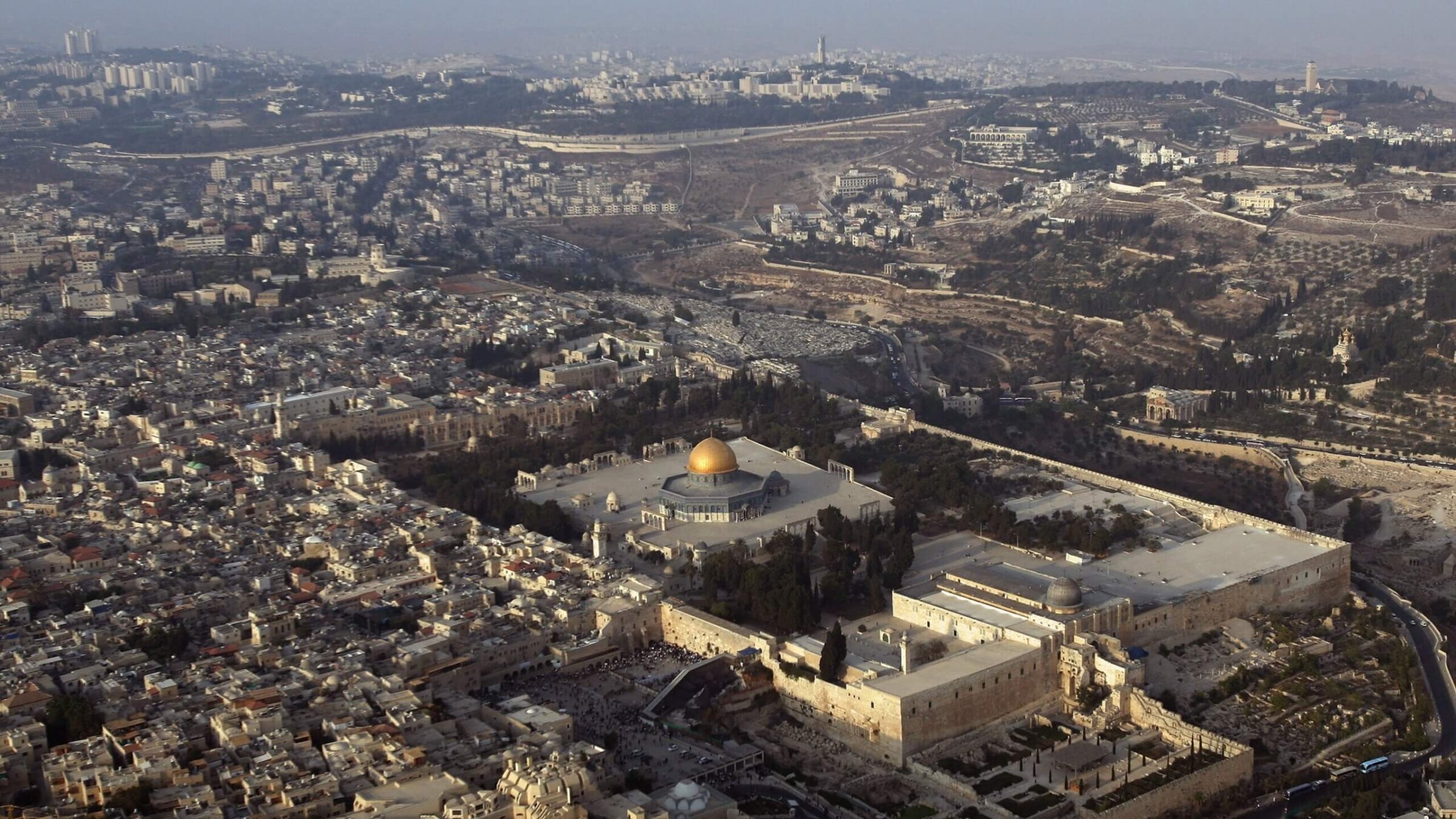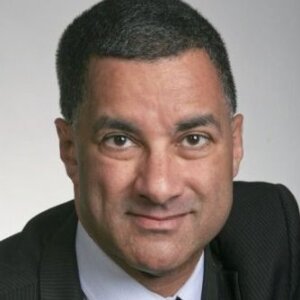Jerusalem Day celebrates the city’s reunification. Great Britain’s cryptic anthem is another story entirely
The hymn ‘Jerusalem’ with words by William Blake glorifies the ancient city — in England

Aerial view of the Old City of Jerusalem, Oct. 2, 2007. Photo by David Silverman/Getty Images
I did not get up at 4 a.m. to watch the coronation of King Charles the other week. Nor did I watch the live BBC broadcast still going on six hours later. So it took me a full day to get the answer to the one question I had.
No, not whether Meghan Markle attended the long-awaited big day for her dad-in-law (she didn’t – not even in disguise). I also wasn’t looking for something going wrong, like a crown falling off. (Camilla did seem to struggle to balance hers at one point, but she made it through.)
Rather, my royal watching was focused on seeing if the multitudes in attendance would break into a chorus of “Jerusalem.” The stirring hymn, composed by Sir Hubert Parry in 1916 to words of the Romantic-era mystic poet William Blake, is the unofficial second national anthem of Great Britain. It’s famously sung by everyone in Royal Albert Hall to close out the Proms — the country’s premiere concert series — and at other patriotic events. It’s a quintessentially British song -– except it’s about Jerusalem. Kind of.
Blake’s poem begins with four questions — and not the ones I grew up with. The first three are solely about England:
And did those feet in ancient time
Walk upon England’s mountains green:
And was the holy Lamb of God,
On England’s pleasant pastures seen?
And did the Countenance Divine,
Shine forth upon our clouded hills?
…before the fourth question arrives at the titular city:
And was Jerusalem builded here,
Among these dark Satanic Mills?
Except wait — is he putting Jerusalem in England?
We have no idea what Blake’s intention was, but the usual place for scholars to start is with those feet in ancient time. It’s often interpreted as the notion that Jesus Christ may have visited England during an undocumented period of his Earthly life. Not having read the New Testament fully, I was surprised to learn recently that Jesus had quite a few lost years — including his entire adolescence — that comprise a whole segment of Christology.
Specifically, his feet touching English soil is said to have happened a few years before his crucifixion, one story being that he sailed with an uncle named Joseph (presumably Mary’s brother) on a trip to trade copper and lead for tin.
The easy answer to all four questions is “No” — as in none of that happened. Writers like Jason Whittaker and Kate Maltby have dismantled the premises of the four questions: Jesus did not walk upon England’s green mountains, nor did the Lamb of God, and ‘Countenance Divine’ did not shine forth. The ancient city of Jerusalem was not birthed in Great Britain. But that doesn’t stop the masses from singing once they get going. The next lines are particularly inspiring:
Bring me my Bow of burning gold:
Bring me my arrows of desire:
Bring me my Spear: O clouds unfold!
Bring me my Chariot of fire!
Those of us who reached adulthood around the early ‘80s can’t help thinking of the movie Chariots of Fire, which chronicles the halcyon days of British runners competing in the Olympics. But that wasn’t my introduction to the hymn. I grew up listening to records of Paul Robeson belting it out, paying little attention to the lyrics. I assumed it was something Jewish, consistent with Robeson’s singing in Yiddish more than a few times.
There are in fact adherents to Anglo-Israelism, who claim that Israelites migrated to the British Isles, whether before the time of Jesus or a few centuries afterward. Much if not all of their contention has been debunked, but what religion doesn’t contain at least an element of the absurd? Mine certainly does.
For the real meaning of the hymn, Whittaker and Maltby tell us Blake was writing about none of this. He didn’t subscribe to the Jesus-went-to-England theory, nor was he even talking about the horrors of the early industrial revolution when writing of dark satanic mills; they hadn’t been built yet. What he was talking about was … who knows? Blake was one of the most cryptic writers who ever lived.
Regardless, the hymn caught on. Maybe it was pride in the notion that England’s green and pleasant land would be a swell place to build a new Jerusalem — never mind that they basically conquered the world for a few centuries looking for someplace better.
So why didn’t King Charles invoke this desire for ‘Jerusalem’ when finally achieving his life’s ambition? I scrolled through the entire BBC coronation footage to confirm the anthem wasn’t sung, and downloaded the official song sheets as well. For good measure, I searched Charles’ mother, Queen Elizabeth II’s coronation 70 years earlier. It wasn’t sung then either, though not because of any reservations about espousing Anglocentric theology. While Charles bent over backwards to include interfaith clergy in his coronation, he also had to mouth clearly non-ecumenical pronouncements of the Church of England, as his mother did to a greater extent in 1953.
On my one and only trip to Jerusalem in 1983, I found myself frequently humming the hymn, most memorably when happening upon a pile of rocks surrounding a small outdoor movie theater where Fellini’s Satyricon was playing. Back home, Chariots of Fire had already been released and its theme song was getting good airplay, becoming an earwig along with Paul Robeson’s booming voice. Yes, I heard the refrain “England” loud and clear in my head and knew the hymn had nothing to do with the city I was visiting.
But how could I not be inspired? Especially with the last verse making it personal:
I will not cease from Mental Fight,
Nor shall my sword sleep in my hand:
Till we have built Jerusalem,
In England’s green and pleasant Land.
Or, all right — somewhere.






















